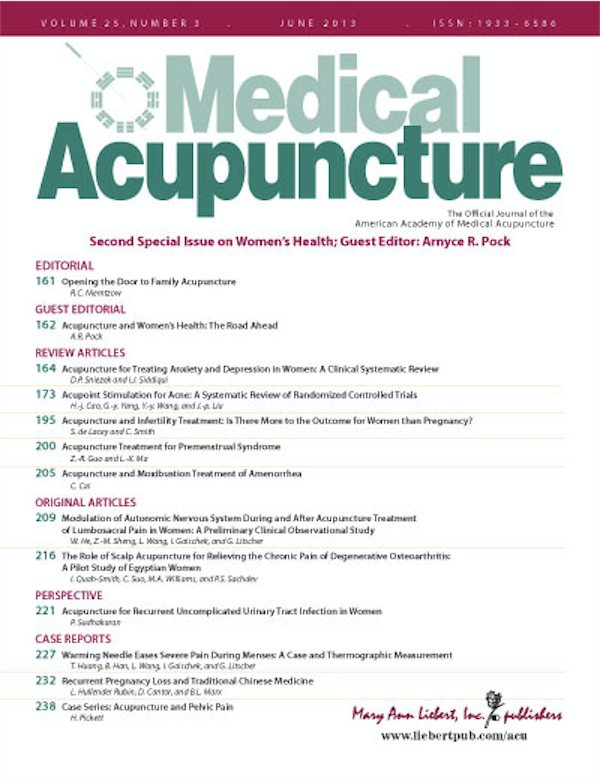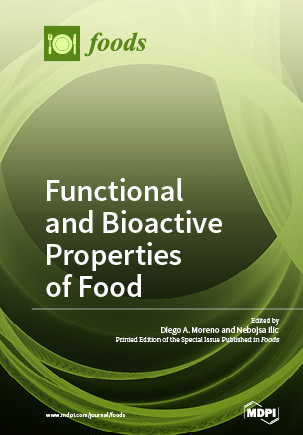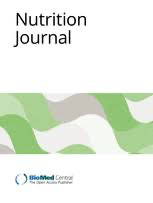Morning Sickness
How to submit an article:
- Registered users can submit any published journal article that has a unique DOI (Digital Object Identifier) name or link to Research Hub.
- For example, you can paste the full DOI link:
https://doi.org/10.1109/5.771073or just the DOI name:10.1109/5.771073into the field above and click submit. - The person who is first to submit a valid article to Research Hub will forever be credited for it, and every article submission earns you +6 Research Points.
Also known as: Hyperemesis Gravidarum
Related Topics
Published research studies are articles that present the findings of original research that has undergone a peer-review process and has been made publicly available in scholarly journals, books or other media.

Effectiveness of Acupuncture in the Treatment of Hyperemesis Gravidarum: A Systematic Review and Meta-Analysis
2021 Jul 28 Evidence-Based Complementary and Alternative Medicine Haizhen Lu, Chengwen Zheng, Yanmei Zhong, Linhao Cheng, Yi Zhou
Systematic Review Meta-Analysis Morning SicknessAcupuncture is an effective approach for hyperemesis gravidarum and has a great potential to mitigate ketonuria, ease nausea and vomiting, increase food intake, and shorten the hospital stay.

Ginger on Human Health: A Comprehensive Systematic Review of 109 Randomized Controlled Trials
2020 Jan 6 Nutrients Anh NH, Kim SJ, Long NP, Min JE, Yoon YC, Lee EG, et al.
Systematic Review Ginger Digestive Health Anti-Inflammatory Bowel Cancer Morning SicknessGinger has been effective in a majority of studies, including those that examined the alleviation of nausea and vomiting of pregnancy, digestive function, improvement in the expression level of markers for colorectal cancer risk, and anti-inflammatory functions.

Integrating Acupuncture for Preeclampsia with Severe Features and HELLP Syndrome in a High-Risk Antepartum Care Setting
2019 Dec Medical Acupuncture Kocher Z, Hobbs V
This case study showed that acupuncture was effective in improving the viability of the baby. This can be done by reducing the patient's BP, increasing her uterine blood flow, and providing renal protection.
Case ReportSeverity of Nausea and Vomiting in Singleton and Twin Pregnancies in Relation to Fetal Sex: The Japan Environment and Children’s Study (JECS)
2019 Sep 05 Journal of Epidemiology Mitsuda N, Eitoku M, Maeda N, Fujieda M, Suganuma N
Female sex birth and multiple births are risk factors for the presence of nausea and vomiting during pregnancy (NVP), and especially for severe NVP without interaction. These findings suggest that a factor abundant in the female fetus associates with the severity of NVP.
Clinical Study Morning Sickness
How Safe Is Ginger Rhizome for Decreasing Nausea and Vomiting in Women during Early Pregnancy?
2018 Apr 01 Foods Stanisiere J, Mousset PY, Lafay S
Systematic Review Ginger Morning SicknessGinger emerges as a safe and effective treatment for nausea and vomiting in early pregnancy.
Research insights are moderated by the Research Hub team and offer an at-a-glance overview of interesting research findings.

2021 Evidence-Based Complementary and Alternative Medicine
Acupuncture is an effective approach for hyperemesis gravidarum and has a great potential to mitigate ketonuria, ease nausea and vomiting, increase food intake, and shorten the hospital stay.
Systematic Review
Effectiveness of Acupuncture in the Treatment of Hyperemesis Gravidarum: A Systematic Review and Meta-Analysis
Haizhen Lu, Chengwen Zheng, Yanmei Zhong, Linhao Cheng, Yi Zhou

2020 Nutrients
Ginger has been effective in a majority of studies, including those that examined the alleviation of nausea and vomiting of pregnancy, digestive function, improvement in the expression level of markers for colorectal cancer risk, and anti-inflammatory functions.
Systematic Review Anti-Inflammatory Bowel Cancer Digestive Health Ginger
Ginger on Human Health: A Comprehensive Systematic Review of 109 Randomized Controlled Trials
Anh NH, Kim SJ, Long NP, Min JE, Yoon YC, Lee EG, et al.

2018 Foods
Ginger emerges as a safe and effective treatment for nausea and vomiting in early pregnancy.
Systematic Review Ginger
How Safe Is Ginger Rhizome for Decreasing Nausea and Vomiting in Women during Early Pregnancy?
Stanisiere J, Mousset PY, Lafay S

2016 BMC Complementary Medicine and Therapies
Acupoint stimulation shows promise in alleviating nausea and vomiting in pregnancy.
Systematic Review
Effect of acustimulation on nausea and vomiting and on hyperemesis in pregnancy: a systematic review of Western and Chinese literature
Van den Heuvel, E., Goossens, M., Vanderhaegen, H. et al.

2014 Nutrition Journal
Ginger could be considered a harmless and possibly effective alternative option for women suffering from nausea and vomiting during pregnancy.
Systematic Review Ginger
A systematic review and meta-analysis of the effect and safety of ginger in the treatment of pregnancy-associated nausea and vomiting
Viljoen, E., Visser, J., Koen, N. et al.
Review Articles
Review articles summarise and critically evaluate the current state of research on a specific topic or field by synthesising multiple primary research studies.

Effectiveness of Acupuncture in the Treatment of Hyperemesis Gravidarum: A Systematic Review and Meta-Analysis
2021 Jul 28 Evidence-Based Complementary and Alternative Medicine Haizhen Lu, Chengwen Zheng, Yanmei Zhong, Linhao Cheng, Yi Zhou
Systematic Review Meta-Analysis Morning SicknessAcupuncture is an effective approach for hyperemesis gravidarum and has a great potential to mitigate ketonuria, ease nausea and vomiting, increase food intake, and shorten the hospital stay.

Ginger on Human Health: A Comprehensive Systematic Review of 109 Randomized Controlled Trials
2020 Jan 6 Nutrients Anh NH, Kim SJ, Long NP, Min JE, Yoon YC, Lee EG, et al.
Systematic Review Ginger Digestive Health Anti-Inflammatory Bowel Cancer Morning SicknessGinger has been effective in a majority of studies, including those that examined the alleviation of nausea and vomiting of pregnancy, digestive function, improvement in the expression level of markers for colorectal cancer risk, and anti-inflammatory functions.

How Safe Is Ginger Rhizome for Decreasing Nausea and Vomiting in Women during Early Pregnancy?
2018 Apr 01 Foods Stanisiere J, Mousset PY, Lafay S
Systematic Review Ginger Morning SicknessGinger emerges as a safe and effective treatment for nausea and vomiting in early pregnancy.

Effect of acustimulation on nausea and vomiting and on hyperemesis in pregnancy: a systematic review of Western and Chinese literature
2016 Jan 13 BMC Complementary Medicine and Therapies Van den Heuvel, E., Goossens, M., Vanderhaegen, H. et al.
Systematic Review Meta-Analysis Morning SicknessAcupoint stimulation shows promise in alleviating nausea and vomiting in pregnancy.

A systematic review and meta-analysis of the effect and safety of ginger in the treatment of pregnancy-associated nausea and vomiting
2014 Mar 19 Nutrition Journal Viljoen, E., Visser, J., Koen, N. et al.
Systematic Review Review Article Ginger Morning SicknessGinger could be considered a harmless and possibly effective alternative option for women suffering from nausea and vomiting during pregnancy.
Clinical Trials
Clinical trials are research studies that involve people and are conducted to evaluate the safety and efficacy of new treatments or interventions, such as drugs, medical devices, or behavioural therapies.
Study Protocols
Published study protocols are detailed plans that outline the objectives, methodology, statistical analyses, and organisation of a research study that have been made publicly available for others to review and use as a reference.
Presentation Slides

Systematic Review
Acupuncture is an effective approach for hyperemesis gravidarum and has a great potential to mitigate ketonuria, ease nausea and vomiting, increase food intake, and shorten the hospital stay.
Haizhen Lu, Chengwen Zheng, Yanmei Zhong, Linhao Cheng, Yi Zhou

Systematic Review
Ginger has been effective in a majority of studies, including those that examined the alleviation of nausea and vomiting of pregnancy, digestive function, improvement in the expression level of markers for colorectal cancer risk, and anti-inflammatory functions.
Anh NH, Kim SJ, Long NP, Min JE, Yoon YC, Lee EG, Kim M, Kim TJ, Yang YY, Son EY, Yoon SJ, Diem NC, Kim HM, Kwon SW.

Systematic Review
Ginger emerges as a safe and effective treatment for nausea and vomiting in early pregnancy.
Stanisiere J, Mousset PY, Lafay S

Systematic Review
Acupoint stimulation shows promise in alleviating nausea and vomiting in pregnancy.
Van den Heuvel, E., Goossens, M., Vanderhaegen, H. et al.

Systematic Review
Ginger could be considered a harmless and possibly effective alternative option for women suffering from nausea and vomiting during pregnancy.
Viljoen, E., Visser, J., Koen, N. et al.
Executive Summary
Write an executive summary in the form of a blog article on the topic of "Research into Chinese medicine treatment for Morning Sickness" summarising the research below and using language that can be easily understood by patients and avoiding medical jargon using a professional and caring tone of voice.
Write an executive summary in the form of a blog article on the topic of "Researched Chinese medicine treatments for Morning Sickness" summarising the research below in an objective and easy to understand way, and using language that can be easily understood by patients. Group the article into Chinese medicine treatments first, followed by nutrition and other treatments. Avoid using medical jargon and use a professional and caring tone of voice.
Write me a concise but easy to understand executive summary on the topic of "Chinese medicine treatments for Morning Sickness" based on the following research that I will give you. Your summary should be 2 paragraphs long in Australian English spelling and include references to the studies.
A Systematic Review published in 2021 in the journal Evidence-Based Complementary and Alternative Medicine found that Acupuncture is an effective approach for hyperemesis gravidarum and has a great potential to mitigate ketonuria, ease nausea and vomiting, increase food intake, and shorten the hospital stay. Studies meeting inclusion criteria, from 1995 to 2020, have been incorporated into this meta-analysis to make evaluations on the outcome of acupuncture in the treatment of hyperemesis gravidarum (HG). Totally, 16 studies and 1043 patients (531 vs 512) were covered. According to this study, acupuncture was more effective than the conventional treatment of HG; it could better promote the conversion of the urinary ketone to improve ketonuria. In terms of symptoms, acupuncture seems to be more effective in reducing nausea and vomiting and increasing food intake. In short, acupuncture is an effective approach for HG and has a great potential to mitigate ketonuria, ease nausea and vomiting, increase food intake, and shorten the hospital stay. There is some evidence that acupuncture may be utilized as a supplement and alternative to HG. However, the poor quality of the incorporated studies and potential publication bias can exert a certain impact on the results. For the better clinical application and promotion of acupuncture in the treatment of HG, more large-scale samples, multi-center, and top-quality RCTs are needed urgently. In the future, it is necessary to further study the relationship between acupuncture and conventional medication and acupuncture placebo to obtain the best clinical solution.
A Systematic Review published in 2020 in the journal Nutrients found that Ginger has been effective in a majority of studies, including those that examined the alleviation of nausea and vomiting of pregnancy, digestive function, improvement in the expression level of markers for colorectal cancer risk, and anti-inflammatory functions. Ginger is a natural spice that is used in diverse regions to add a pungent flavor to food. Furthermore, ginger has been used as an herbal medicine for common health problems. This systematic review is the first study that has exclusively collected RCTs regarding the efficiency of ginger in several human health conditions. The clinical effects of ginger have been introduced as six subsections: nausea and vomiting, gastrointestinal function, pain, inflammation, metabolic syndromes, and other symptoms. Reportedly, ginger has been effective in a majority of studies, including those that examined the alleviation of nausea and vomiting of pregnancy, digestive function, improvement in the expression level of markers for colorectal cancer risk, and anti-inflammatory functions. Several other functions have also been regarded as beneficial in trials, with some confronting results. However, a few drawbacks regarding the quality of the trials, inconsistent evaluation systems or parameters, and the generally small size of the studies need to be noted. Therefore, systematically designed research with detailed descriptions of methodology and a sufficient pool of participants is necessary for future clinical trials to address the functional characteristics of ginger.
A Systematic Review published in 2018 in the journal Foods found that Ginger emerges as a safe and effective treatment for nausea and vomiting in early pregnancy. Nausea and vomiting of pregnancy (NVP) affect 7 in 10 pregnant women, significantly impacting their quality of life. Concerns about the safety of traditional antiemetic drugs have led to the consideration of natural options like ginger, which has shown favorable risk/benefit ratios and strong evidence. Ginger supplements with 0.5 to 2 g of root per day can effectively alleviate NVP. However, ensuring ginger quality is crucial, especially in monitoring methyleugenol concentration for potential toxicity. The variability in gingerol composition among supplements underscores the importance of stringent quality control measures. Studies have not found significant reproductive or developmental risks associated with ginger use during pregnancy, but medical supervision and case-specific evaluation are essential. Further research on ginger's effect on platelet aggregation in pregnant women is recommended.
A Systematic Review published in 2016 in the journal BMC Complementary Medicine and Therapies found that Acupoint stimulation shows promise in alleviating nausea and vomiting in pregnancy. This review assesses acupoint stimulation techniques for treating nausea and vomiting in pregnancy (NVP) and hyperemesis gravidarum (HG). Of 29 studies, 20 were included in quantitative analyses. Acupressure, acupuncture, auricular acupressure, and moxibustion were examined. While acupressure showed a 41% reduction in symptom severity, acupuncture had double the effect of control groups, and moxibustion improved symptoms by 65%. Continuous outcome measures did not show significant relief. Adverse events were minimal. The study calls for more rigorous trials, emphasizing the need for blinding and standardizing treatment protocols for conclusive results on acupoint stimulation's efficacy in NVP and HG.
A Systematic Review published in 2014 in the journal Nutrition Journal found that Ginger could be considered a harmless and possibly effective alternative option for women suffering from nausea and vomiting during pregnancy. This review suggests potential benefits of ginger in reducing nausea symptoms in pregnancy (bearing in mind the limited number of studies, variable outcome reporting and low quality of evidence). Ginger did not significantly affect vomiting episodes, nor pose a risk for side-effects or adverse events during pregnancy. Based on evidence from this systematic review, ginger could be considered a harmless and possibly effective alternative option for women suffering from nausea and vomiting during pregnancy.
Moderation Tools
Topic
Sign In
Users not signed in are limited to viewing the 5 most recent items of content.